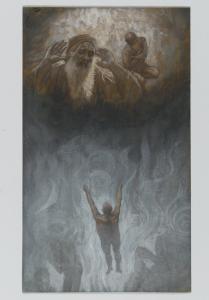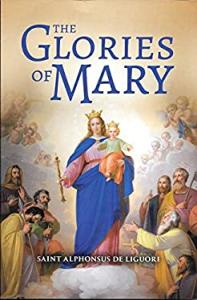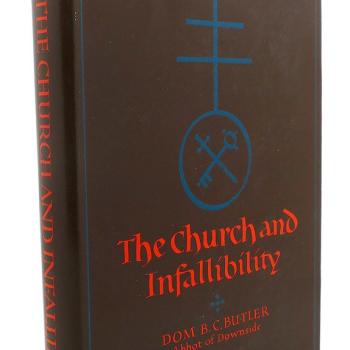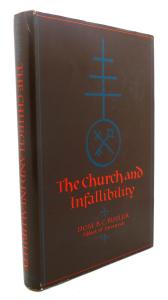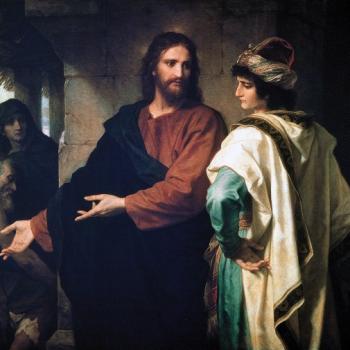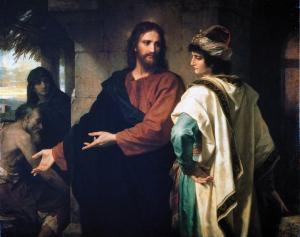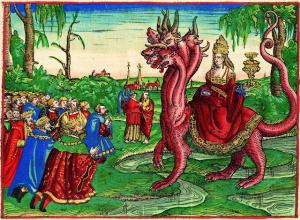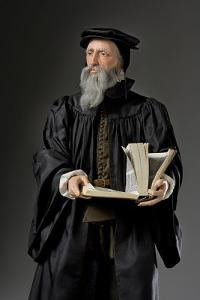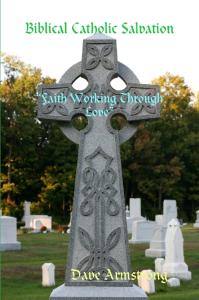
[see book information and purchase options]
Jason Engwer is a prolific Protestant anti-Catholic apologist and webmaster of the site, Triablogue. He used to interact with me from 2000 to 2010 or so and then promptly stopped. I continue to critique his material, if I think there is educational value in doing so. Maybe one day he’ll decide to start dialoguing again. In any event, I’ll continue to do what I’ve done these past [nearly] 33 years as a Catholic apologist, and if I see that he makes some dubious claim against a Catholic position, I’ll respond, provided it is substantive enough to be worth addressing.
*****
I’m replying to an old debate (dated sometime prior to August 2004) that Jason had with Robert Sungenis on the topic of justification. I will interact only with Jason’s portions. His words will be in blue. I use RSV for Bible citations.
As James explains in 2:8-12, people would have to live perfectly, obeying all of God’s laws (James 2:10), in order to be saved through works. Instead of trusting in a law of works, we have to trust in a law of liberty (James 2:12).
James is reiterating that the law doesn’t save anyone, which is elementary NT soteriology, and a proposition concerning which Catholics and Protestants are in full agreement (see Rom 4:13-16). On the other hand, St. Paul notes that it is “the doers of the law who will be justified” (Rom 2:13) and that “the law is holy, and the commandment is holy and just and good” (Rom 7:12) and “Christ is the end of the law” (Rom 10:4) and “love is the fulfilling of the law” (Rom 13:10). In other words, although the law itself doesn’t save, and “was our custodian until Christ came” (Gal 3:24), nevertheless, those who are justified by grace through faith will always do works, flowing from this grace-soaked faith, and these will be meritorious and play a role in their salvation. It’s not law and works by themselves, but flowing from faith (James 2:14, 17-18, 20-22, 24-26). These works are meritorious and help bring about salvation and eternal life:
Romans 1:17 For in it the righteousness of God is revealed through faith for faith; as it is written, “He who through faith is righteous shall live.”
Romans 5:10 For if while we were enemies we were reconciled to God by the death of his Son, much more, now that we are reconciled, shall we be saved by his life.
Romans 6:22 But now that you have been set free from sin and have become slaves of God, the return you get is sanctification and its end, eternal life.
2 Thessalonians 2:13 . . . God chose you from the beginning to be saved, through sanctification by the Spirit and belief in the truth.
Hebrews 11:4 By faith Abel offered to God a more acceptable sacrifice than Cain, through which he received approval as righteous,
Jude 1:20-21 But you, beloved, build yourselves up on your most holy faith; pray in the Holy Spirit; keep yourselves in the love of God; wait for the mercy of our Lord Jesus Christ unto eternal life.
He’s addressing the evidence of saving faith (James 2:14).
Not at all. Rather, in that verse he is asserting that faith alone cannot save (“Can his faith save him?”), and has to be accompanied by works, so that possessing both, a person can be saved. He makes this perfectly plain ten verses later: “You see that a man is justified by works and not by faith alone” (Jas 2:24), and also three verses later: “faith by itself, if it has no works, is dead” (Jas 2:17).
Since faith always comes before works, do [Catholics] want to argue that people respond to the gospel with dead faith, which becomes living faith only later?
That’s not possible for a Catholic to do, according to Trent, in its Canons 1 and 3 on Justification:
CANON I. If any one saith, that man may be justified before God by his own works, whether done through the teaching of human nature, or that of the law, without the grace of God through Jesus Christ; let him be anathema.
CANON III. If any one saith, that without the prevenient inspiration of the Holy Ghost, and without his help, man can believe, hope, love, or be penitent as he ought, so as that the grace of Justification may be bestowed upon him; let him be anathema.
There’s no way to avoid the fact that Genesis 15:6 refers to righteousness being reckoned through faith alone, when Abraham does nothing more than trust God. There is no baptism, giving money to the poor, or any other work done in Genesis 15:6. Righteousness was reckoned to Abraham through faith alone, . . . James 2:23 refers to Abraham having righteousness reckoned through faith alone. There are no works in Genesis 15:6. . . .
Genesis 15:6 does tell us what Paul means by “faith”. What occurs in Genesis 15:6? Is Abraham baptized? Is he circumcised? Does he give money to the poor? No, Abraham just believes God. That’s faith alone. If somebody today did nothing more than what Abraham did in Genesis 15:6, you as a Catholic would say that he was unjustified.
James (2:23) gives an explicit interpretation of Genesis 15:6, by stating, “And the scripture was fulfilled which says, ‘Abraham believed God, and it was reckoned to him as righteousness,’ and he was called the friend of God.” The previous three verses were all about justification, faith and works, all tied in together (2:20: “faith apart from works is barren”; 2:22: “faith was active along with his works, and faith was completed by works”) and this is what James says “fulfilled” Genesis 15:6. So, no, according to the inspired exegesis of James, Abraham was not justified by “faith alone” in Genesis 15:6.
James tells another person to “show me” his faith through his works (James 2:18). That’s justification before men. We see something similar in James 3:13. Who would have seen Abraham’s work of offering Isaac? Isaac would have seen it. And millions of others have seen it by means of hearing about it through scripture. The idea of justification before men, regardless of whether the word “justify” is used, is a theme we see often in scripture, sometimes negatively (Matthew 6:1-5, Luke 16:15, Romans 4:2, Galatians 3:11) and sometimes positively (Luke 7:35, James 2:18, 3:13). The phrase “before God” in a passage such as Galatians 3:11 seems to assume that you can be justified before others as well. The concept of being justified, or vindicated, before men is Biblical and is what James refers to in 2:18. What else would “show me” mean?
I don’t see how this proves that James is operating with an entirely different conception of works (“before men only, and not before God”). To the contrary, James, just like Paul, ties both faith and works into salvation, not just flattering and God-honoring appearances before men. They are connected to salvation itself (1:12, 21-22; 2:14) as well as to justification (2:21, 24-25); both things directed “Godward” and not merely towards other persons. Abraham proved that he feared God and believed. But it was not “before men.” It was a thing that was in and of itself, whether anyone saw it or not, and before God (for His sake, not God’s).
Per the usual unacceptable anti-Catholic method of citing the Church fathers, Jason cites three carefully selected snippets from St. John Chrysostom, out of context, in which he uses the phrases “faith alone” and “faith only”:
They said that he who kept not the Law was cursed, but he proves that he who kept it was cursed, and he who kept it not, blessed. Again, they said that he who adhered to Faith alone was cursed, but he shows that he who adhered to Faith alone is blessed. (Commentary on Galatians, 3)
by faith alone He saved us (Homilies on Ephesians, 5)
In his homily on Galatians 3, Chrysostom was treating the same topic as Paul in that passage: whether one is saved / justified by the law or by faith. Paul states in Galatians 3 that “no man is justified before God by the law” (3:11) and that we are “justified by faith” (3:24). That is the topic, rather than a supposed denial of works also being necessary in the quest for and attainment of salvation. Chrysostom, accordingly, cites Galatians 5:4: “You are severed from Christ, you who would be justified by the law; you have fallen away from grace.” He is basically making the same reference to initial justification in his comment from Homily 5 on Ephesians, too.
Catholics fully agree with Protestants that initial justification is monergistic and comes entirely through God’s grace (not by the law), which brings about our faith in response. What we deny is the notion of obtaining a salvation that can never be lost, through faith, and the notion that works play no role whatsoever in our salvation and justification, after initial justification. That is the particular sense in which Chrysostom uses “faith alone” in the words Jason cites. This isn’t “faith alone” in the Protestant sense at all, and we know this for sure, by noting what he said about “faith alone” many times elsewhere (see below).
Attend to this, ye who come to baptism at the close of life, for we indeed pray that after baptism ye may have also this deportment, but thou art seeking and doing thy utmost to depart without it. For, what though thou be justified: yet is it of faith only. But we pray that thou shouldest have as well the confidence that cometh of good works (Homilies on Second Corinthians, 2)
In his Homily 2 on Second Corinthians, Chrysostom immediately conjoins the faith with works, and I commend Jason for including that portion. I take it that the “confidence” referred to is confidence of procuring salvation, if one continues faithfully in the Way. Moreover, in his comment on 1:6-7 he expressly denies “faith alone”:
for not through believing only comes your salvation, but also through the suffering and enduring the same things with us. . . . the work of salvation consists not in doing evil, but in suffering evil.
Therefore, he provides an interpretation of his own use of the phrase “faith only” in the same piece of writing, and proves that it is not according to the Protestant notion of “faith alone.”
For my part, I take into account St. John Chrysostom’s entire teaching on the topic; for example, as part of my extensive research for my 303-page book, The Quotable Eastern Church Fathers: Distinctively Catholic Elements in Their Theology (July 2013). This book included almost seven pages of his citations opposing “faith alone” and another five pages of his statements on “faith and works.” That’s real — and appropriately thorough — research, folks, as opposed to mere “quote-mining” for “pet passages”. But Jason didn’t cite passages such as the following from the great saint and Doctor of the Church:
Ver. 7. “To them who by patient continuance in well doing seek for glory and honor and immortality, eternal life.” Here also he awakens those who had drawn back during the trials, and shows that it is not right to trust in faith only. For it is deeds also into which that tribunal will enquire. (Homily V on Romans 1:28: v. 2:7; my italics)
For “each of us shall give account of himself to God.” In order therefore that we may render up this account with a good defence, let us well order our own lives and stretch out a liberal hand to the needy, knowing that this only is our defence, the showing ourselves to have rightly done the things commanded; there is no other whatever. And if we be able to produce this, we shall escape those intolerable pains of hell, . . . (Homily XXI on 1 Corinthians 9:1, 11, v. 9:12; my italics)
[H]ow, tell me, doth faith save, without works? (Homily IV on Ephesians, v. 2:8-10; my italics)
He too was one of the guests, for he had been invited; but because, after the invitation and so great an honor, he behaved with insolence towards Him who had invited him, hear what punishment he suffers, how pitiable, fit subject for many tears. For when he comes to partake of that splendid table, not only is he forbidden the least, but bound hand and foot alike, is carried into outer darkness, to undergo eternal and endless wailing and gnashing of teeth. Therefore, beloved, let not us either expect that faith is sufficient to us for salvation; for if we do not show forth a pure life, but come clothed with garments unworthy of this blessed calling, nothing hinders us from suffering the same as that wretched one. (Homily X on John, v. 1:13; my italics)
“Is it then enough,” saith one, “to believe on the Son, that one may have eternal life?” By no means. And hear Christ Himself declaring this, and saying, “Not every one that saith unto Me, Lord, Lord, shall enter into the kingdom of heaven” ( Matt. vii. 21 ); and the blasphemy against the Spirit is enough of itself to cast a man into hell. But why speak I of a portion of doctrine? Though a man believe rightly on the Father, the Son, and the Holy Ghost, yet if he lead not a right life, his faith will avail nothing towards his salvation. Therefore when He saith, “This is life eternal, that they may know Thee the only true God” ( c. xvii. 3 ), let us not suppose that the (knowledge) spoken of is sufficient for our salvation; we need besides this a most exact life and conversation. Since though he has said here, “He that believeth on the Son hath eternal life,” and in the same place something even stronger, (for he weaves his discourse not of blessings only, but of their contraries also, speaking thus: “He that believeth not the Son shall not see life, but the wrath of God abideth on him”;) yet not even from this do we assert that faith alone is sufficient to salvation. And the directions for living given in many places of the Gospels show this. Therefore he did not say, “This by itself is eternal life,” nor, “He that doth but believe on the Son hath eternal life,” but by both expressions he declared this, that the thing doth contain life, yet that if a right conversation follow not, there will follow a heavy punishment. (Homily XXXI on John, v. 3:35-36; my italics)
How long shall we neglect our own salvation? Let us bear in mind of what things Christ has deemed us worthy, let us give thanks, let us glorify Him, not by our faith alone, but also by our very works, that we may obtain the good things that are to come . . . (Homily XLVI on John, v. 6:52; my italics)
[A] right faith availeth nothing if the life be corrupt, both Christ and Paul declare . . . (Homily LXIII on John, v. 11:40; my italics)
Faith is indeed great and bringeth salvation, and without it, it is not possible ever to be saved. It suffices not however of itself to accomplish this, . . . on this account Paul also exhorts those who had already been counted worthy of the mysteries; saying, “Let us labor to enter into that rest.” “Let us labor” (he says), Faith not sufficing, the life also ought to be added thereto, and our earnestness to be great; for truly there is need of much earnestness too, in order to go up into Heaven. (Homily VII on Hebrews, v. 4:11-13; my italics)
For unless we add also a life suitable to our faith, we shall suffer the extremest punishment. (Homily LXIV on Matthew 19:27, 4; my italics)
Should I conclude, then, that all of these people agreed with my view of salvation? No, obviously not. A church father could refer to salvation being through “faith alone” in one passage, but refer to baptismal regeneration or some other form of salvation through works elsewhere. He may have been inconsistent. Or he may have just defined “faith alone” differently than I do. We would have to examine each case individually.
I agree. I did examine St. John Chrysostom’s teachings on this specific topic sufficiently enough to reach a firm conclusion. Jason did not. And so he put out a mistaken, incomplete picture, and hence indefensibly misrepresented Chrysostom. It happens all the time with anti-Catholic attempts at “patristics.”
For [Catholics] to say that the words “faith alone” don’t appear in a passage like Mark 2:5 or Luke 18:10-14 is inconclusive. The concept can be there without the words being there, just as the concept can be absent with the words being there. Is the concept of faith alone present in passages like Mark 2:5 and Luke 18:10-14? Yes, it is. . . .
The man in Mark 2:5 was paralyzed. He didn’t do any works. He wasn’t water baptized, was he? The text says that Jesus forgave him upon seeing their faith, not their faith and their works. Jesus could have told the paralytic that he was healed, then told him to be baptized if he wanted to be saved. Instead, Jesus saved him through faith alone.
Technically, from the passage, we know that the man’s sins prior to that time were forgiven, not that he was eschatologically saved. That is an assumption unwarranted in the text, that smuggles in Protestant faith alone soteriology and eternal security.
To dismiss this case as an exception to the rule is arbitrary. As we’ll see, Mark 2:5 isn’t the only example of a Biblical figure being saved through faith alone, and we have no examples of a person believing, but being unforgiven until his baptism. Passages like Mark 2:5 aren’t exceptions to the rule. They’re examples of the rule.
Mark 2:5 reads, “And when Jesus saw their faith, he said to the paralytic, ‘My son, your sins are forgiven.’ ” This teaches (I think, arguably, anyway) justification by faith, but not “faith alone.” The two concepts are distinct. Catholics accept the first thing and reject the second as unscriptural and illogical. It’s the same for Luke 18:10-14. There simply isn’t enough information in the passage to conclude “faith alone.” Every mention of “faith” is not a proof of “faith alone.”
What about Luke 18:10-14? Jesus says nothing at all about baptism or any other work.
Rather delightfully, Luke 18:10-14 concludes four verses before the passage about the rich young ruler, in which he asks Jesus, “what shall I do to inherit eternal life?” (18:18). Jesus in His two-part answer never mentions faith, but rather, He asked whether the man kept the commandments (18:20); then upon finding out that he did, said, “One thing you still lack. Sell all that you have and distribute to the poor, and you will have treasure in heaven” (18:22). Two works are what would save him, according to God the Son, and this has to be harmonized with His teaching in Luke 18:10-14. That is the furthest thing imaginable from “faith alone.” Thus, Catholics fully concur with the [initial] justification by faith in both passages brought up by Jason, while not agreeing that subsequent faith is sufficient for salvation without accompanying works.
The thief on the cross (Luke 23:39-43) would be yet another example [Catholics] would have to dismiss as an exception to the rule.
*
Of course we would, since that man couldn’t do anything (including any work or baptism) even if he wanted to. So it’s an exceptional situation, and God understands that. So do Catholics when we use it as the prime example of a “baptism by desire.”
*
[T]he Judaizers Paul was responding to in his writings, for example, didn’t deny the necessity of faith. They denied the sufficiency of faith. This is why Paul assumed that the Galatians would agree with him that their Christian life at least began with faith (Galatians 3:2). It’s not as though the Judaizers were opposed to having faith. Instead, the Judaizers, like Roman Catholics, added works as a requirement for salvation.
*
We do so because Jesus, Paul, and the Bible massively, undeniably do so, and we follow them wherever they lead. See:
*
*
*
The reason why Paul had to define grace (Romans 11:6) and could assume that his opponents accepted the necessity of faith (Galatians 3:2) was because his opponents claimed to believe in salvation by grace and through faith. But they added works to grace and faith. The Roman Catholic Church has done the same thing. . . .
*
Paul is not excluding a type of works that does nullify saving grace, while including another type of works that doesn’t nullify saving grace. Rather, he’s excluding all work, because work of any type would nullify salvation by grace.
*
Jason’s premise is wrong, because Paul — like Jesus (reply to the rich young ruler, etc.) — believed that works were necessary, too:
Romans 1:17 For in it the righteousness of God is revealed through faith for faith; as it is written, “He who through faith is righteous shall live.”
Romans 6:22 But now that you have been set free from sin and have become slaves of God, the return you get is sanctification and its end, eternal life.
2 Thessalonians 2:13 . . . God chose you from the beginning to be saved, through sanctification by the Spirit and belief in the truth.
I know, I already cited these, but repetition is a good teacher. And there is nothing better to recite and memorize than Holy Scripture. Sanctification and righteousness (including good works) are parts of the cause of salvation, not merely an optional way of “thanking God” for a salvation already supposedly gained with no chance of ever losing it: so says St. Paul.
*
Why is it that there are so many dozens of passages in scripture about salvation that only mention faith?
*
Because this is referring to initial justification, which indeed comes by and through faith, enabled by grace. Why is it — since we are asking challenging questions — that there are so many dozens of passages in scripture (
at least fifty) about salvation that only mention
works? Why is it that Jesus only mentioned works to
the rich young ruler: precisely in reply to his query about how one attains heaven and is saved?
*
Since the work of justification was done by Christ, and that work is finished, it makes no sense to refer to multiple justifications.
*
It makes just as much sense as it does for Paul to refer to an ongoing tense of “being saved” in the Bible:
1 Corinthians 1:18 For the word of the cross is folly to those who are perishing, but to us who are being saved it is the power of God. [note that Paul includes himself in this description, as well as the entire Corinthian assembly of Christians]
It makes as much sense as it does for the Bible to refer to a future salvation that is only attained through much effort and time:
Matthew 10:22 . . . he who endures to the end will be saved. (cf. 24:13; Mk 13:13)
*
Acts 15:11 But we believe that we shall be saved through the grace of the Lord Jesus . . .
*
Philippians 2:12 . . . work out your own salvation with fear and trembling
*
Philippians 3:11-12 that if possible I may attain the resurrection from the dead. [12] Not that I have already obtained this or am already perfect; but I press on to make it my own, . . .
*
It makes as much sense as Paul stating that salvation — far from being a one-time instant thing — was relatively “nearer to us now than when we first believed” (Rom 13:11), or that we as believers nevertheless still have a “hope of salvation” (1 Thess 5:8), or Peter asserting that we Christians are those who “grow up to salvation” (1 Pet 2:2).
If salvation is an ongoing process or lifelong quest (as I have just proven with ten Bible passages), then so is justification. It’s common sense. I also proved in a recent article utilizing the example of Abraham (including NT interpretations of his justification), that justification is ongoing and comes by works as well as by faith.
God glorifies those He justifies (Romans 8:30).
*
Of course He does. This particular verse tells us nothing about whether justification is a long process or can be lost, or is tied inexorably to sanctification. In context, however, Paul does clarify and states that we can become “heirs of God and fellow heirs with Christ, provided we suffer with him in order that we may also be glorified with him” (Rom 8:17). Note that suffering is a prerequisite for glorification and eschatological salvation, and he appears to be talking about a long process. This is verified by 8:18, where he states that “the sufferings of this present time are not worth comparing with the glory that is to be revealed to us,” and especially in the following passage:
Romans 8:35-36 Who shall separate us from the love of Christ? Shall tribulation, or distress, or persecution, or famine, or nakedness, or peril, or sword? [36] As it is written, “For thy sake we are being killed all the day long; we are regarded as sheep to be slaughtered.”
Paul repeatedly refers to people having peace in the present (Romans 5:1)
*
Absolutely. He writes in that verse that “since we are justified by faith, we have peace with God through our Lord Jesus Christ.” Catholics believe in a
moral assurance of future salvation, conditional upon avoiding mortal sin or formally confessing it should we commit it. Then Paul refers in 5:2 to “this grace in which we stand.” But is that forever determined in one moment of decision for us? No. This grace can be
lost, as Paul also teaches:
1 Corinthians 9:27 but I pommel my body and subdue it, lest after preaching to others I myself should be disqualified.
1 Corinthians 10:12 Therefore let any one who thinks that he stands take heed lest he fall.
Galatians 5:4 You are severed from Christ, you who would be justified by the law; you have fallen away from grace.
1 Timothy 4:1 Now the Spirit expressly says that in later times some will depart from the faith by giving heed to deceitful spirits and doctrines of demons.
1 Timothy 5:15 For some have already strayed after Satan.
and assurance of the future (Romans 5:9-10, 6:8) because of a past justification.
*
Those passages have to be interpreted in light of the five above, which also come from Paul. Taken together, it adds up to a moral assurance, precisely as Catholics teach. One can have a very high degree of moral assurance, and trust in God’s mercy. St. Paul shows this. He doesn’t appear worried at all about his salvation, but on the other hand, he doesn’t make out that he is absolutely assured of it and has no need of persevering. He can’t “coast.” That seems to be his outlook. We can have assurance and faith and hope, yet this is understood within a paradigm of perseverance and constant vigilance in avoiding sin, that has the potential to lead us to damnation.
*
Moreover, Paul says that we will be presented “holy and blameless and irreproachable before him, provided that” we “continue in the faith, stable and steadfast, not shifting from the hope of the gospel which [we] heard” (Col 1:22-23). The “past justification” is our initial one, but it can be lost through sin and rebellion, if we fail to persevere in grace (Gal 5:4) and seriously fall short in following God’s moral commands.
*
In passages like Mark 2:5, Luke 18:10-14, Acts 10:44-48, etc., there aren’t any saving works. Those passages . . . exclude all works.
*
This is an argument from silence, which never prove much, if anything. To simply not mention a thing in merely one passage is not proof that it is excluded altogether. Secondly, I already noted that Luke 18:10-14 is four verses before the rich young ruler passage. If in fact Jesus “excluded all works” in 18:10-14, then He almost immediately contradicted Himself in telling the rich young ruler that he could be saved and go to heaven by following the commandments and selling all that he had (i.e., two works; and Jesus never mentioned faith when asked about the process of salvation). Acts 10:44-48 is about the day of Pentecost and Christians first receiving the indwelling of the Holy Spirit. In that respect it is very similar to initial justification: God acting unilaterally in bestowing a tremendous blessing.
*
Nobody has ever been saved by obeying God’s commandments, even when they had faith.
Luke 18:18, 20 And a ruler asked him, “Good Teacher, what shall I do to inherit eternal life?” . . . [20] [Jesus] “You know the commandments: . . . “
According to Jesus, obeying the commandments can indeed save a person. He did go on to say that the rich young ruler “lack[ed]” just one thing: he had to give hiss possessions to the poor. So, then, he would have been saved by the commandments and one specific additional command from God to do a good work. Faith is never mentioned. According to Protestantism, Jesus would necessarily (lest he lead us all astray) have had to say something along the lines of, “Two things you still lack. Sell all that you have and distribute to the poor, and exercise faith alone in me, and you will have treasure in heaven.”
*
That doesn’t even make any sense. If he had to do this work to be saved, then it clearly wasn’t faith alone. I would say that it’s implied that he had faith, in his following of the commandments. He had to believe in God in order to believe that these commandments came from Him and were worthwhile to abide by. But if faith alone is true, and if in fact “Nobody has ever been saved by obeying God’s commandments, even when they had faith,” then this passage could not possibly be written the way it is in fact written in the inspired, infallible revelation of Holy Scripture. And Jesus would become a sincere teacher of heresy at best or a lying deceiver at worst.
Romans 2:6-7, 13 For he will render to every man according to his works: [7] to those who by patience in well-doing seek for glory and honor and immortality, he will give eternal life; . . . [13] For it is not the hearers of the law who are righteous before God, but the doers of the law who will be justified.
*
Matthew 25:31-36 “When the Son of man comes in his glory, and all the angels with him, then he will sit on his glorious throne. [32] Before him will be gathered all the nations, and he will separate them one from another as a shepherd separates the sheep from the goats, [33] and he will place the sheep at his right hand, but the goats at the left. [34] Then the King will say to those at his right hand, `Come, O blessed of my Father, inherit the kingdom prepared for you from the foundation of the world; [35] for I was hungry and you gave me food, I was thirsty and you gave me drink, I was a stranger and you welcomed me, [36] I was naked and you clothed me, I was sick and you visited me, I was in prison and you came to me.’”
*
Revelation 2:23 . . . I am he who searches mind and heart, and I will give to each of you as your works deserve.
*
Revelation 20:11-13 Then I saw a great white throne and him who sat upon it; from his presence earth and sky fled away, and no place was found for them. [12] And I saw the dead, great and small, standing before the throne, and books were opened. Also another book was opened, which is the book of life. And the dead were judged by what was written in the books, by what they had done. [13] And the sea gave up the dead in it, Death and Hades gave up the dead in them, and all were judged by what they had done.
*
Revelation 22:12 Behold, I am coming soon, bringing my recompense, to repay every one for what he has done.
In these five passages, works alone are said to be a direct cause of justification (Rom 2:6-7, 13) and final salvation and admittance to heaven (Mt 25:31-36; Rev 2:23; 20:11-13; 22:12). This doesn’t exclude faith (by the same principle of the argument from silence just mentioned; and Catholics certainly don’t exclude it), but it does exclude “faith alone”, since for that to be true, it would have to be the only reason why people were saved, rather than works also being required, or being the only thing (alone or not) mentioned as being required, as in these passages.
*
Paul is excluding even good works done with faith and in obedience to God. He excludes the possibility that anybody has fulfilled Romans 2:13.
*
Nonsense. If this were true, then Paul would have had to write in Romans 2:13, “it is . . . the doers of the law who will not be justified.” But in fact he wrote, under the inspiration of the Holy Spirit: “it is . . . the doers of the law who will be justified” (Rom 2:13). Jason’s extreme antipathy towards works — let it be known — amounts to a fringe and reactionary “faith alone” outlook that verges on antinomianism, and which is rejected by many if not most conservative Protestant theologians.
*
According to the Catholic Church, we are saved through laws such as the ten commandments . . . Nobody would arrive at the Roman Catholic gospel by studying the teachings of Jesus and the apostles.
*
According to Jesus, too (Lk 18:20): at least in the case of the rich young ruler. I’m very glad that if we must have an honest disagreement with someone, it’s with Jason and not Our Lord Jesus. I build an elaborate extensive scriptural case for Catholic soteriology, precisely by highlighting (with scores of NT passages) the teachings of Jesus and Paul.
*
Peter and the other apostles said that salvation comes upon believing response to the preached word
*
They also wrote the following (and these passages must be harmonized in any coherent take on NT soteriology):
Mark 16:16 He who believes and is baptized will be saved; but he who does not believe will be condemned.
Acts 2:38-41 And Peter said to them, ‘Repent, and be baptized every one of you in the name of Jesus Christ for the forgiveness of your sins; and you shall receive the gift of the Holy Spirit. For the promise is to you and to your children and to all that are far off, every one whom the Lord our God calls to him.’ And he testified with many other words and exhorted them, saying, ‘Save yourselves from this crooked generation.’ So those who received his word were baptized, and there were added that day about three thousand souls.
Acts 22:16 And now why do you wait? Rise and be baptized, and wash away your sins, calling on his name. (cf. 9:17-18)
Romans 6:3-4 Or don’t you know that all of us who were baptized into Christ Jesus were baptized into his death? We were therefore buried with him through baptism into death in order that, just as Christ was raised from the dead through the glory of the Father, we too may live a new life.
1 Peter 3:21 Baptism … now saves you …
[Catholics] would never tell people that believing in Christ gives them life and keeps them from condemnation. Instead, [Catholics] would tell them about . . . obeying the ten commandments, etc. You would tell them that believing in Christ isn’t enough.
If we did this (and of course it’s not all we do, and is a misinformed caricature), it would be exactly what Jesus said and didn’t say in Luke 18 (talking to the rich young ruler). That’s a good model to follow, I would say, since Jesus said, “he who believes in me will also do the works that I do” (Jn 14:12). One of these works was telling the rich young ruler how to be saved. So we can and should imitate it, according to Jesus’ words in John 14:12. Jesus also said — when He was being more detailed about these matters, as opposed to “proverbial” — that simply believing in Him wasn’t enough: “Why do you call me ‘Lord, Lord,’ and not do what I tell you?” (Lk 6:46). We should never contradict Jesus. Jason is in deep spiritual trouble and theological confusion by frequently doing so. It’s a frightening thing. And he continues to teach others on his blog.
Those who claim that faith must be combined with works in order for a person to be saved can’t explain the passages of scripture in which people are saved when they believe, before doing any works.
That’s easy. They aren’t “saved” in the sense that it can never be lost; they are initially justified (which is a monergistic, unilateral action of God’s grace). They are in good graces with God, and only “saved” in the sense that they will attain heaven if they persevere and never fall away from faith and grace.
Jesus didn’t always require faith to physically heal people or to perform some other miracle for them, but He did require faith to heal them spiritually.
He didn’t in the case of Paul, who had no Christian faith before God supernaturally converted him on the spot. We know this for sure because when this occurred, Jesus said to him (present tense), “Saul, Saul, why do you persecute me?” (Acts 9:4) and “I am Jesus of Nazareth whom you are persecuting” (Acts 22:8).
there are no scriptural examples of people not being saved until they work,
See Matthew 25:31-36; Luke 6:46; 18:18 ff.; John 14:12; Romans 1:17; 2:6-7, 13; 5:10; 6:22; Philippians 2:12; 3:11-12; 2 Thessalonians 2:13; Hebrews 11:4; Revelation 2:23; 20:11-13; 22:12 — that’s fifteen passages (fifteen more than “no scriptural examples“), almost all of which were fully cited, above.
Romans 2:12-13 says that obedience to the law without sin brings justification.
Then how can Paul say, “the doers of the law who will be justified” (2:13)? In other words, there are some who will be justified (innumerable passages in Paul), and to do so — according to what he states here — they had to follow the law by doing it. It’s not saying that this has to necessarily be done in a sinless state (Jason arbitrarily and groundlessly merely assumes that); only that it is the ones who act according to the law who will be justified, and insofar as they do that, they did it without sin, since disobeying the law, not following it, is sin. But none of this excludes faith. It’s asserting, rather, the necessity of works in the overall equation and process of justification and salvation.
*
The Roman Catholic Church teaches that we attain eternal life through grace, faith, and a system of works.
*
So does the New Testament; especially
Jesus and
Paul, as repeatedly proven above. That’s exactly why
we teach it! It’s Protestant soteriology that is shockingly unbiblical and which massively contradicts the Bible.
*
Acts 16:31 is heresy to a Roman Catholic.
*
Not in the slightest. It simply states the principle that belief and faith in Jesus are necessary for salvation. Yes, of
course! DUH! Elsewhere, the Bible frequently elaborates upon this and on how works are incorporated into the process of the attainment of salvation. Protestants like Jason only look at one sort of passage and ignore other related, relevant ones, leading to misleading half-truths (which are not much better than outright falsehoods). Catholics, in great contrast, harmonize all of them together.
*
This stark difference of methodology can be readily observed, above. Note the huge amount of Scripture I bring to bear: virtually all of which Jason ignored in his presentation. The Bible is the Bible, and it’s all inspired, infallible revelation. If we ignore or rationalize large portions of it, only harm (and possibly, eventual spiritual ruin) will result.
*
Jason almost certainly won’t reply to this because he has ignored my dozens of rebuttals of his arguments since 2010. But even in the days when he did respond, he would often ignore some 80% of my arguments (
as I documented after becoming very tired of it), so he would likely do the same with all this scriptural data, if the past is a reliable guide. In fact, my documentation of his pathetic and what must also be called cynical “debate” (?) method of
extreme “picking-and-choosing” appears to be what caused him to stop replying to me altogether.
*
***
*
Or you may believe my work is worthy to support for the purpose of apologetics and evangelism in general. If so, please seriously consider a much-needed financial contribution. I’m always in need of more funds: especially
monthly support. “The laborer is worthy of his wages” (1 Tim 5:18, NKJV). 1 December 2021 was my 20th anniversary as a
full-time Catholic apologist, and February 2022 marked the 25th anniversary of my blog.
*
*
***
Summary: The exact nature of justification, relationship of faith and works, and sanctification and justification are discussed in reply to anti-Catholic Jason Engwer.



